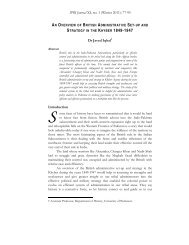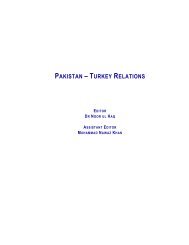120 Whither Kashmir? (Part II) - Islamabad Policy Research Institute
120 Whither Kashmir? (Part II) - Islamabad Policy Research Institute
120 Whither Kashmir? (Part II) - Islamabad Policy Research Institute
Create successful ePaper yourself
Turn your PDF publications into a flip-book with our unique Google optimized e-Paper software.
<strong>Whither</strong> <strong>Kashmir</strong>?<br />
On May 26, police placed Syed Ali Shah Geelani, chairman of a<br />
faction of the separatist Hurriyat Conference, under house arrest. Police<br />
invoked the PSA and accused him of leading protests regarding the rape<br />
and killing of two Shopian women and an alleged police cover-up of those<br />
events. In July the Jammu and <strong>Kashmir</strong> High Court overturned the PSA<br />
charges against Geelani and directed authorities to release him; they did<br />
so on Sept 9.<br />
The report observes Courts in Jammu and <strong>Kashmir</strong> often are<br />
reluctant to hear cases involving insurgent and terrorist crimes and failed<br />
to act expeditiously, if at all, on habeas corpus cases.<br />
According to a study by the South Asia Forum for Human Rights<br />
and the Centre for Law and Development, thousands of habeas corpus<br />
cases were pending in the courts throughout the <strong>Kashmir</strong> valley.<br />
Political Prisoners and Detainees<br />
NGOs reported that Jammu and <strong>Kashmir</strong> held political prisoners, and<br />
the government from time to time temporarily detained hundreds of<br />
persons characterised as terrorists, insurgents, and separatists. Human<br />
rights activists based in the state estimated there were 150 political<br />
prisoners. Prisoners arrested under one of the special antiterrorism laws<br />
often were not formally charged, nor did their family or other visitors<br />
have access to them.<br />
In Jammu and <strong>Kashmir</strong>, Punjab, and Manipur, authorities have<br />
special powers to search and arrest without a warrant. Human rights<br />
groups reported that security forces in Jammu and <strong>Kashmir</strong> targeted<br />
suspected terrorists, insurgents, and their supporters.<br />
Human rights groups maintained that in Jammu and <strong>Kashmir</strong> and<br />
in the northeastern states, military and paramilitary forces continued to<br />
hold numerous persons. Human rights activists feared that many of these<br />
unacknowledged prisoners were tortured and some may have been killed.<br />
Dawn (<strong>Islamabad</strong>), March 12, 2010.<br />
http://www.dawn.com/wps/wcm/connect/dawn-content-library/dawn/thenewspaper/international/14-us-reports-widespread-rights-violations-in-occupiedkashmir-230-zj-10<br />
KASHMIR HAS 97000 ORPHANS, 32000 WIDOWS: STUDY<br />
The two-decade conflict in <strong>Kashmir</strong> has rendered more than 32000<br />
women as widows and more than 97000 children as orphans, reveals a<br />
research study.<br />
67




